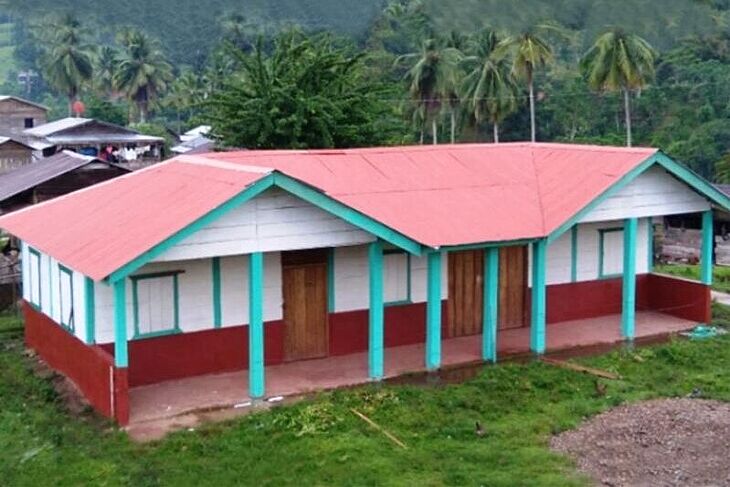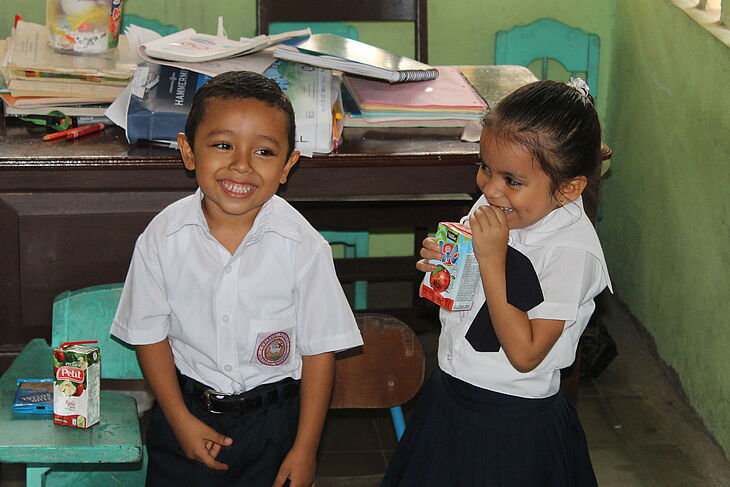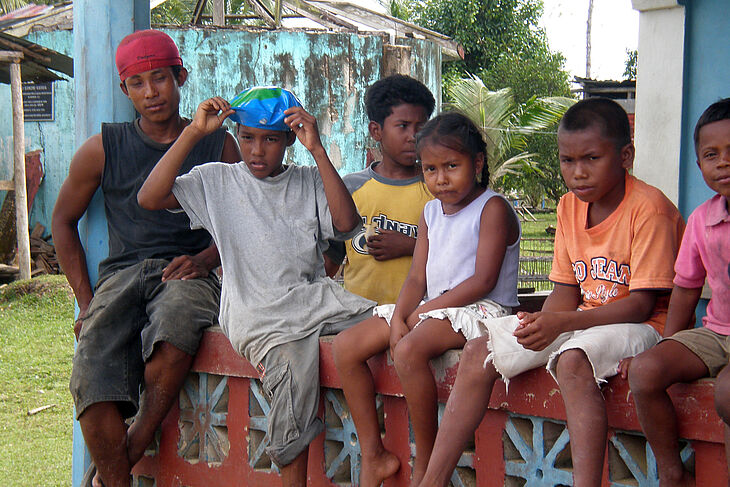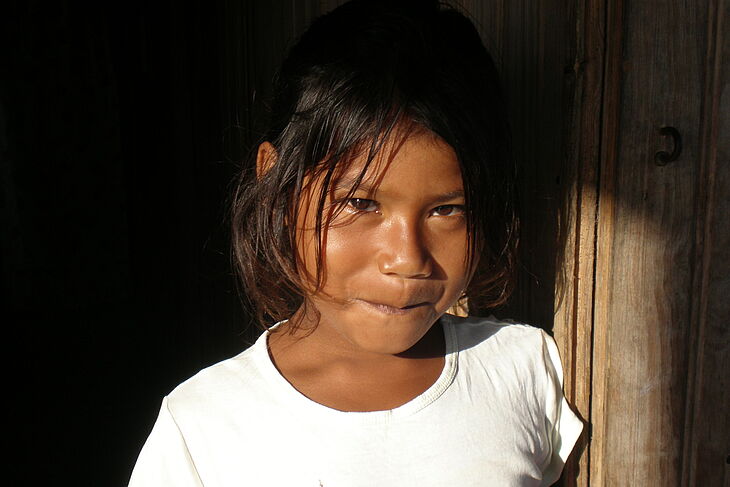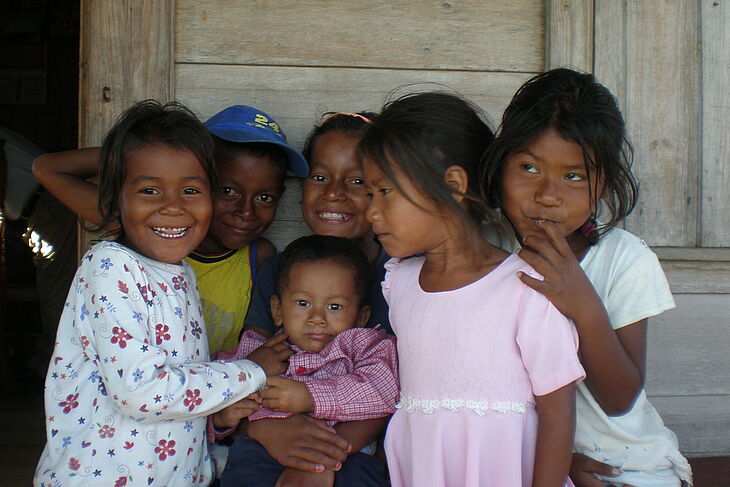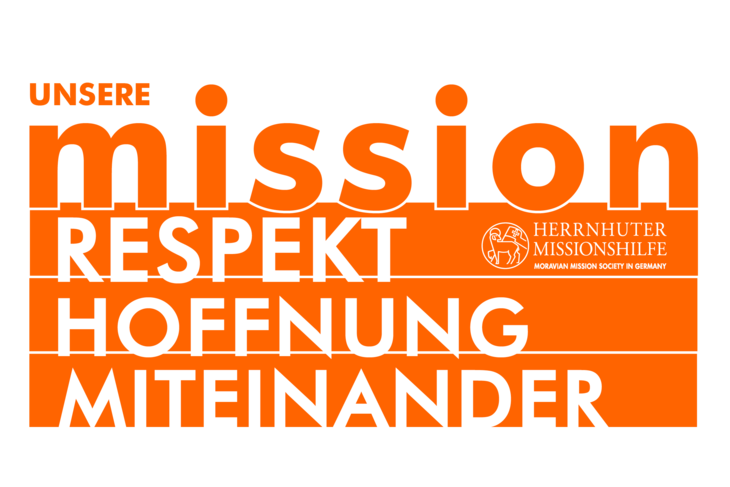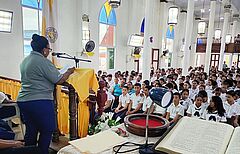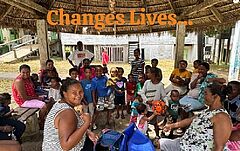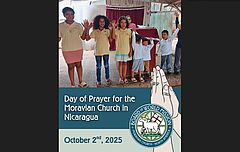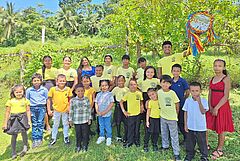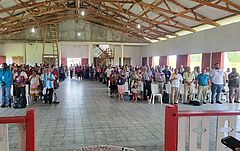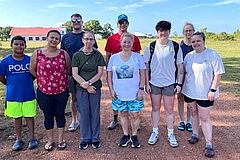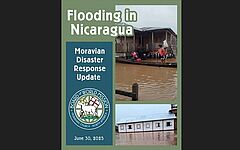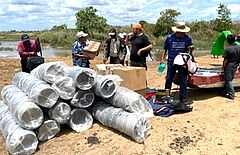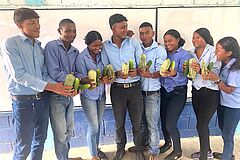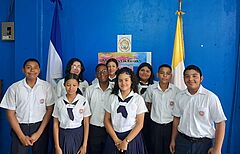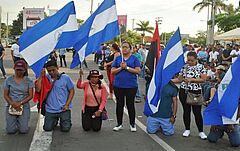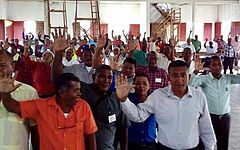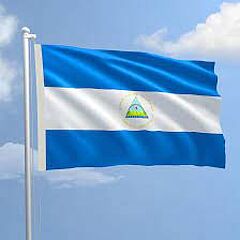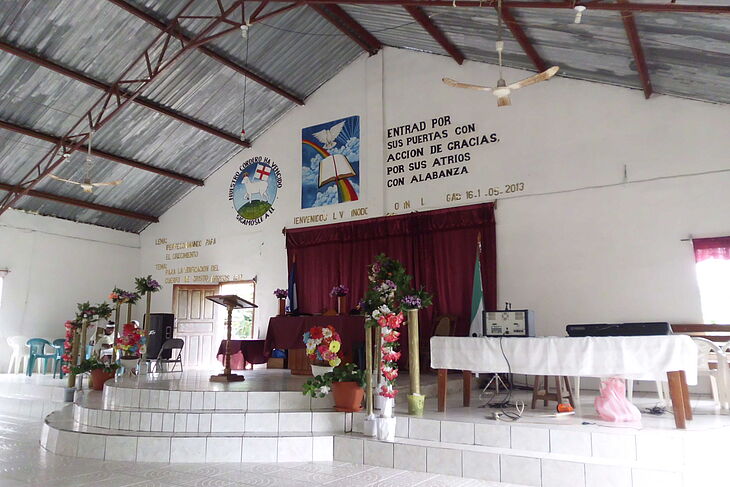Nicaragua & Honduras
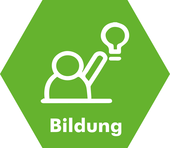
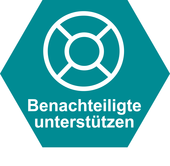
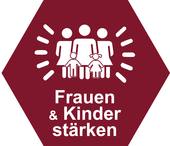
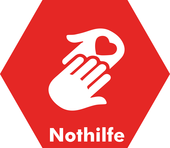
Nicaragua & Honduras
Nicaragua
Nicaragua is located on the Central American land bridge in Central America. To the east of the country lies the Caribbean Sea and to the west the Pacific Ocean. To the north, Nicaragua borders Honduras and to the south Costa Rica. Nicaragua is the largest country in Central America. It is also home to the largest freshwater lake, Lago de Nicaragua or Cocibolca.
Nicaragua can be roughly divided into three regions: the Pacific coast (Region de Pacífico) and the center (Región Central) of the country, where most of the population lives and which is divided into 15 administrative regions, and the Caribbean coast (Regiones Autónomas), which is much less developed and consists of two autonomous administrative regions.
The official language is Spanish, which is the mother tongue of a large part of the population. Other languages are Creole (especially on the east coast of the country) and Indio languages such as Miskito in particular. The population belongs predominantly to Catholicism, but Protestant churches and various natural religions can also be found.
The population, called Nicas, consists mainly of mestizos. Other groups are the Nicaraguans of European and African origin and the indigenous people.
Nicaragua is called the Land of a Thousand Volcanoes because a chain of active volcanoes parallels the Pacific coast. The country has two large inland lakes. In the southwest is Lake Nicaragua, in the west Lake Managua. In Lake Nicaragua there are islands with a great variety of birds and archaeological remains. The capital Managua is the economic center and the most modern city of the country.
The highlands in the north are dominated by coffee and tobacco cultivation. In the vast cloud forests there are several nature reserves, where the bird of the gods, the quetzal, lives.
Nicaragua was settled about 3,000 years ago by hunter-gatherers from Mexico. The name of the country is derived from a leader of the indigenous people of Nicaragua, Nicarao. In 1502, Christopher Columbus was the first European to set foot in Nicaragua. By 1524, the country had been conquered from Panama for the Spanish crown and remained a Spanish colony until 1821, when it gained its independence and finally became an independent republic in 1839. Civil war broke out in the 1850s, during which the U.S. mercenary William Walker came to power with the help of a private army and briefly became president. A joint intervention by the Central American states led to his ouster. U.S. troops occupied the country from 1912-1933, and General Sandino waged a guerrilla war against them beginning in 1926. Sandino was assassinated in 1934 by the National Guard trained by U.S. troops. The commander-in-chief of the National Guard, Anastasio Somoza, became head of state three years later. The Somoza family dictatorship lasted until 1979, when their rule was ended by an alliance of bourgeois and Sandinista forces. Subsequently, Daniel Ortega, one of the leaders of the Sandinistas, ruled Nicaragua. 1981-1990 saw the Contra War, in which U.S.-backed Contra rebels fought against the leftist Sandinista government. In 1990, Violetta Barrios de Chamorro became president, followed by Arnoldo Alemán and Enrique Bolaños. Ortega has held the presidency again since 2006. Corruption and suppression of the opposition have turned Nicaragua into a dictatorship and isolated it internationally.
Like Honduras, Nicaragua is a transit country for drugs smuggled from Colombia to the United States and Canada. The drug cartels exercise economic and political power, especially on the east coast.
Honduras
Honduras is located in Central America, between North and South America. Its neighboring countries are Guatemala and El Salvador to the west and Nicaragua to the southeast. The country's name is derived from the Spanish word hondura, meaning deep, and refers to the deep waters in the Caribbean Sea off the coast of Honduras.
The climate is tropical. The capital, Tegucigalpa, is also the country's largest city, with a population of about 1,000,000.
Since 1982, Honduras has been a representative democracy with a president at its head. Before that, there was a military dictatorship for many years. In 2009, there was a coup d'état and the president, who had been democratically elected by the people, was deported abroad. However, the new head of government was not recognized by many countries and human rights violations increased. A democratically elected president has been in power again since 2010. His main goals are to improve the education system, fight corruption and poverty. There are large disparities between rich and poor. Crime in Honduras has reached alarming levels. It is characterized by a high propensity to violence, even under the influence of drugs, and a low inhibition threshold for the use of firearms. These factors have increased the risk when traveling to and in Honduras in recent years. Kidnappings and robberies involving the use of firearms are on the rise in San Pedro Sula, Santa Barbara, Tegucigalpa, La Ceiba, and the Bay Islands. Of particular concern are violent youth gangs (maras), to which more than 40,000 young people have now joined. German nationals have also been among the victims in the past.
In Honduras, many people are farmers who grow rice, corn or beans. For the economy of Honduras, the sale of fruit - especially bananas -, coffee and flowers is very important. The landscape of Honduras is characterized by sandy bays on the Caribbean Sea, mountains and rainforests. Dense jungle can be found on the border with Nicaragua. Many forests are burned or cut down to use the soil for agriculture. Pollution and overfishing also threaten nature. Few states in the Americas are home to so many different species of plants and animals. The beautiful Caribbean coast, coral reefs and pumas, jaguars and tapirs in the wild attract tourists to the country.
Project Pictures
News from the projects
Bishop consecration in Honduras
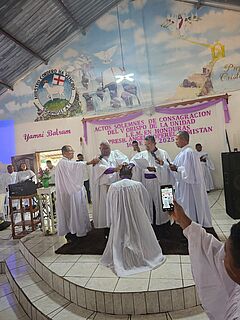
On November 16, 2025, Pastor Ángel Yoporel Pamistan from the Unidad Morava congregation was consecrated as a bishop of the worldwide Moravian Church in the port town of Puerto Lempira in the Honduran Mosquitia. He is the fifth bishop of the Iglesia Morava in Honduras. The consecration was performed by Bishops Evelio Marmol (Honduras) and Rogelio Juan Zacarias (Nicaragua).
There are two provinces of the worldwide Moravian Church in the Honduran Mosquitia. After the official Unity Province underwent Pentecostal changes in the 1990s, the traditional congregations came together in the Mission Province of Honduras. In the meantime, both sides have begun a process of reunification. As in Nicaragua, several ethnic groups belong to the church in Honduras, especially Miskito and, to a lesser extent, Mayangna.
Two news from Nicaragua
- The Morava bookstore in the entrance area of the office of the leadership of the Nicaragua Unity Province in Bilwi/Puerto Cabezas informs that the Bible, the hymnbook (small and large editions), and the daily devotionals in Miskito, Mayangna, and Spanish, a sermon Bible, a Bible dictionary (Reina Valera version), and many other products are available for those who would like to delve deeper into the Bible. The bookstore, which also offers beverages, a few stationery items, and photocopying services, is open Monday through Saturday from 8 a.m. to 5 p.m. Pictures here.
- On November 5, 2025, the Moravian High School (formerly Colegio Moravo Secundaria) in Bluefields in southeastern Nicaragua celebrated the 104th anniversary of its founding with a festive service followed by a large banquet in the school gym. See here and here.
“Ahuas Spotlight” for fall 2025 published
The Board of World Mission (BWM) of the Moravian Church in North America published another Ahuas Spotlight on October 21, 2025. See here. Reports from five different areas of the Clinica Evangelica Morava in Ahuas on the Honduran Mosquito Coast: a) the arrival of a container of relief supplies from the US, b) 27-year-old patient Ora Haylock and her baby, who was born after a previous miscarriage, c) the urgent need to purchase a new X-ray machine, d) the now realistic plan to build a new doctor's residence, e) several so-called 2nd Mile Projects (follow-up projects to secure previous investments). The Clinica Evangelica Morava in Ahuas is the only clinic in a huge, structurally weak area where people in need, mostly indigenous Miskoto, can receive medical assistance.
Day of prayer for the Moravian Church in Nicaragua
The Board of World Mission of the Moravian Church in North America had called for a day of prayer for Nicaragua on October 2, 2025. The leadership of this largest province outside Tanzania (102,000 members; mission began in 1849) requested intercession for: unity among the four bishops, so that the church may follow their example as spiritual fathers; progress in the reconciliation process in the divided province; the health of pastors and church leaders; church members in difficult financial situations; those groups that want to divide the church, that they may instead work for unity; strong faith and hope in God; truthfulness and unity in the church; the church's witness to love and peace; for the opening of paths that seem blocked; for the blowing of the Holy Spirit in the church; for all those in authority in the state; for global partnerships of the church. See in English here.
Two youth events on the east coast of Nicaragua
On October 12, 2025, the annual general meeting of the Moravian Church Youth Association in Nicaragua's Central District took place at the Iglesia Morava Daukra north of Bilwi/Puerto Cabezas, with more than 300 participants. The event marked the 50th anniversary of the association known as AJECIM (Asociación Juvenil Esfuerzo Cristiano de la Iglesia Morava) . Pictures here. On October 4, 2025, AJECIM had already held a cultural and sports festival in Kamla, east of Bilwi/Puerto Cabezas. The motto of the festival was: We should all be one (cf. John 17:21). First, a large opening service was held in the packed Moravian Church. Many pictures here. Later, competitions were held in various open spaces in the village, including soccer, volleyball, and baseball. The atmosphere on the playing fields and among the spectators was fantastic. Many pictures here.
Children's festivals commemorating the children's revival in Herrnhut also held in Nicaragua
On August 17, 1727, a special revival of the children took place in Herrnhut. This is commemorated in many parts of the Unity. Children are the focus of the celebrations. In memory of the children's spiritual experience, joyful children's celebrations were also held in many Moravian Church communities in Nicaragua. Pictures here and here. The children recited, sang, danced, and presented small works of art.
Award winners from Moravian High School in Bluefields presented
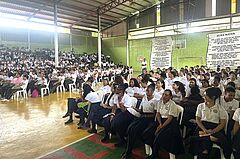
On its Facebook pages, the Moravian High School in Bluefields, Nicaragua (formerly ‘Collegio Moravo’, founded in 1921), presented various prize winners who distinguished themselves in August 2025: Ingini Pérez took first place in a regional public speaking competition. Picture here. She will soon represent her school in this competition at the national level. More pictures from the competition, showing rhetorical warm-up exercises and motivation from the teachers, can be found here. At a regional ‘Science and Life’ fair (similar to ‘Jugend forscht’ in Germany), a group of students consisting of Daniela Mejía, Genesis Mendóza, Keysha Jeanstchke and Zadia Mendóza took second place. See here. The entire school is currently competing for the title ‘Sección Vanguardia - Excelencia Académica’ with its outstanding achievements. 40 pictures from the second evaluation round on 13 August 2025 in the large school sports hall can be found here.
From two synods of the Moravian Church in Honduras
Pictures from the opening service of the XXI Provincial Synod of the Moravian Church in Honduras (Mission Province) in the “Iglesia Morava de Paptalaya” in Ahuas (Gracias A Dios region) in the Honduran Mosquitia on May 30, 2025 can be found here. Two weeks earlier, the VIII General Synod of the Moravian Church in Honduras (Unity Province) took place in the Iglesia Morava Bethel, also in Ahuas. Some pictures and a video of the service on May 11, 2025, in the packed church with the members of the synod can be found here (please click further) and here. In addition to the Honduran Bishop Evelio Romero, several representatives of the worldwide Moravian Church were also present. A new church leadership was elected. The motto of the synod was: “If God is with us, who can be against us? Between struggles and trials, the work of the Moravian Church continues.”
From the “Ahuas Spotlight” for summer 2025, part I
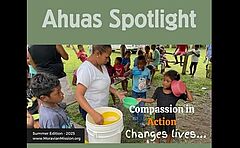
At the end of June/beginning of July 2025, the Board of World Mission of the Moravian Church in North America sent a container of donated medical supplies to the Clínica Evangélica Morava in Ahuas, Honduras. The 21,000 items that were carefully packed into the container include suture material, syringes, gauze, bed sheets, a microscope, sterilization equipment, injection needles, and hospital beds (estimated value: approximately $265,500). Although all of these materials were donated, there are still high costs for administrative fees, legal work, customs formalities, international transport, and local delivery from the port of import in Puerto Cortes over land, across lagoons, and then upriver to the remote congregation of Ahuas (approximately US$25,000 to US$30,000). The large container was filled in cooperation with the NGO Hospital Sisters Mission Outreach in Springfield, Illinois.
From the “Ahuas Spotlight” for summer 2025, part II
A team of seven volunteers from Sturgeon Bay, Wisconsin, continued a decades-long tradition and supported the Clínica Evangélica Morava in Ahuas, Honduras, in the spring of 2025. Among other things, the team members painted and repaired clinic walls, built shelters, cut gauze bandages, and also spent time at the Krupunta branch, where they helped with the infant nutrition program. One team member writes: "As a nurse, I became aware of the daily waste in the US healthcare system. I inserted IVs and removed bandages without gloves. I know that different standards apply in the US, but you often don't realize how wasteful we can be." Dr. Maylo Wood, the clinic's medical director, concludes the Spotlight article by describing newly established regular training and refresher courses for clinic staff in cooperation with the Atlantic Coast Regional University Center of the state university UNAH in La Ceiba. Read the entire Spotlight article here.
Severe flooding in eastern and southern Nicaragua
A few days ago, the leadership of the Unity Province of Nicaragua reported severe flooding in the east and south of the country. Several villages with Moravian Church communities have also been affected by the floods. The photo (see here) flooded Moravian church. There are also reports of fatalities, destroyed crops, and damage to private homes. Initial disaster relief (food supplies, replacement of lost crops, assistance with reconstruction) is being provided by the Board of World Mission of the Moravian Church in North America, the sister organization of the Herrnhuter Missionshilfe. Although the storm is not yet classified as a tropical hurricane, it is carrying enormous amounts of water. It formed on June 26, 2025, off the coast of Venezuela and moved across eastern and southern Nicaragua two or three days later. A meteorological report can be found here.
Successful drinking water project in Honduras to be continued
Four organizations are currently working together to continue a successful drinking water project in southeastern Honduras (Blessings Flow Project): the local Moravian Church, the Board of World Mission of the Moravian Church in North America, the California-based aid organization One ATTA Time which specializes in drinking water projects, and now also the Moravian Church's mission organization in the Netherlands. The most important work in Honduras (distributing simple water filter systems and training local people in their use) is carried out by volunteers from the Moravian Church, including Sister Carmen James and Brother Morlin Perez. With 900 filter systems distributed to date, many serious health problems, such as worm infections in children, have already been prevented. Many people in the Honduran region of La Mosquitia still draw their drinking water from unclean rivers and lagoons. More here.
Progress in several agricultural projects in Honduras
Several agricultural projects in Honduras are showing signs of progress, encouraging further activities. This is reported by the Board of World Mission of the Moravian Church in North America. Students at the Moravian Church's Samuel B. Marx High School in Ahuas, Honduras (La Mosquitia), are now growing cucumbers and zucchinis. A greenhouse is to support the planned reforestation of areas in future. Watermelons, maize and yucca have been planted in the fields of the Ahuas Clinic with promising results. Cocoa seedlings were planted in Kipahni and Wisplini. Although the La Mosquitia region still faces major challenges, particularly in terms of suitable labor, the new partnerships with CURLA (a major university in La Ceiba) and other local actors are strengthening hopes for a better future. See on Facebook here.
From the April events at the “Moravian High School” in Bluefields
Moravian High School in Bluefields on the southern Atlantic coast of Nicaragua reports that there were several special events in school life in April 2025. First of all, on April 9, the school grounds and the so-called herb garden were maintained. See here. On April 10, there were the many tables with very different Lenten meals that children from a school class had prepared during Lent and which could be tasted. See here. Then, in the Easter season of joy, there was a big fashion show under the motto Pool Party, which caused amazement and enthusiasm among the audience in the rows of seats in the school gym. See here. And then there was the annual school Mathematical Olympiad on April 29, in which nine winners were chosen. See here. The Moravian Church in Bluefields is the most English-Caribbean Moravian Church in Nicaragua.
Praying for and with Nicaragua
Under the motto All with Nicaragua, the Latin American and Caribbean Confederation of Religious have invited the Latin American and Caribbean Bishops' Conference to an international day of prayer for Nicaragua on September 24, 2024. Prayer is the main tool of Christians. The country is now facing a crisis of hope, prophecy and solidarity. The Church in Nicaragua is living through the darkest chapter in its history. There are four intercession requests: “We pray that those in power will hear the cry of the people. We pray for the thousands of exiles. We pray for the Church, which is suffering the same pain as the Crucified One. And we pray for the poorest, that is, for the most vulnerable people who are left alone.” Anyone in the world could register in advance for this international day of prayer on the internet. See here and here.
Nicaragua: ADSIM banned
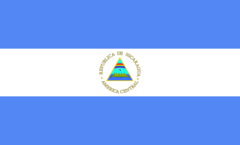
On 16 August 2024, the Nicaraguan government banned over 1000 different NGOs. Among them is ADSIM, Asociación Instituto de Desarrollo Social de la Iglesia Morava, the social organisation of the Moravian Church in Nicaragua. ADSIM has worked in many ways to improve the living conditions of the people on the east coast (mostly Miskitos), for example by providing health services, promoting agriculture and training. ADSIM has also provided Emergency Aid during disasters such as the recurring hurricanes. The ban on ADSIM appears to be part of the Nicaraguan government's fight against the churches.
Prayer request for the Unity Province of Honduras
As the first Thursday in August is the day of prayer for the Unity Province of Honduras in the Moravian Church in North America, Fr Angel Yoperel, the President of the Province, after thanking for a variety of material and personnel support in difficult times, passes on the following prayer requests: ‘Please pray 1. that there will be no more schism in the Moravian Church in Honduras; 2. that there will be no kidnappings and no murders in Honduras; 3. for the upcoming Synod in 2025; 4. for the construction of the provincial office in Honduras, the construction of the Bible school in Puerto Lempira and for the mobile Bible institute in La Ceiba, Atlantida; 5. that there are no natural disasters in our country; 6. for our reconstruction projects (houses and plantations); 7. that we have the necessary money for our ecclesial-social work and that we receive the spirit of unity; 8. that our two bishops give good advice; 9. for the needs of the two provinces; 10. for the dissemination of the watchwords in our country.’
Message of reconciliation to all Moravian Churches in Nicaragua
The bishops of the Unity Province of Nicaragua living in Nicaragua have spoken out about the divisions that have existed for a decade within the Moravian Church in the country. These divisions, which in some cases have already led to physical and structural violence, are based partly on differing political views and partly on ethnicity. The bishops call on the members of the Moravian Church to give a practical Christian witness to life by working for peace, reconciliation and true unity in the Unity Province of Nicaragua. The leaders of both groups in the Unity Province of Nicaragua join the call of their bishops and ask those responsible in the congregations to pass on the attached text (see here) to the members in the various Moravian Churches through all information channels, including announcements in the weekly church services.
Moravian Church in Nicaragua & Honduras
Nicaragua
From the beginning, the Moravian Church has worked almost exclusively on the Atlantic coast of Nicaragua, thus contributing a great deal to the self-assertion of the indigenous peoples there. The seat of the church leadership for about 85,000 members in 200 congregations is Puerto Cabezas, called Bilwi by the natives. The Nicaraguan Atlantic coast is one of the very few areas in the world where the Moravian Church is not a minority but a people's church. Only about 15% of the people there belong to the Catholic Church. Except for Tanzania, no other country in the world has more members of the Moravian Church than Nicaragua. In the federation of the worldwide Moravian Church, the Province of Nicaragua cooperates with six other provinces in the Caribbean Regional Conference.
Herrnhuter Missionshilfe works with local project partners, especially in the area of education, and also supports the children of pastors and church workers in cooperation with Aktion Ausbildungshilfe in Übersee AAiÜ.
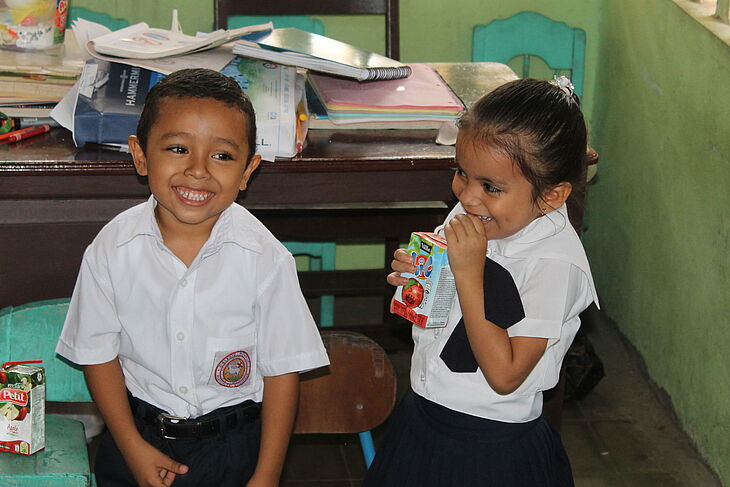
Honduras
The first Moravian Churches in Honduras were established after 1930 through missionary efforts from Nicaragua. In the underdeveloped strip of land between the Atlantic Ocean and the central mountains, the Moravian Church subsequently built numerous schools and health posts, and in 1946 also a hospital of great regional importance that still exists today, the Ahuas Clinic on the Patuca River, with branch offices in Cauquira and Ocotales. The Moravian Church in Honduras has a much weaker structure than the Moravian Church in Nicaragua. Only the Ahuas Clinic has its own Internet presence.
The Moravian Church in Honduras has about 45,000 members. A big problem in Honduras is the increasing criminality and the willingness of the drug cartels to use violence.
In cooperation with Aktion Ausbildungshilfe in Übersee AAiÜ, Herrnhuter Missionshilfe supports the children of the pastors and church workers.
